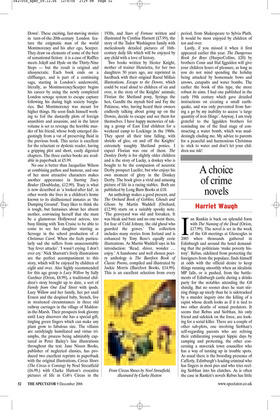A choice of crime novels
Harriet Waugh
Ian Rankin is back on splendid form with The Naming of the Dead (Orion, £17.99). The novel is set in the week of the G8 meetings at Gleneagles in 2005 when thousands gathered in Edinburgh and around the hotel demanding that the politicians ‘make poverty history’. Rebus, sidelined from protecting the foreigners from the populace, finds himself at odds with the official desire to keep things running smoothly when an idealistic MP falls, or is pushed, from the battlements of Edinburgh castle during a drinks party for the notables attending the G8 shindig. But no sooner does he start stirring things up nicely than he is sidetracked by a murder inquiry into the killing of a rapist whose death looks as if it is tied to two other deaths of sexual predators. It seems that Rebus and Siobhan, his only friend and sidekick on the force, are looking for a serial killer. There are a couple of other sub-plots, one involving Siobhan’s self-regarding parents who are reliving their exhilarating younger hippie days by camping and protesting, the other concerning a maverick town councillor who has a way of turning up in trouble spots. As usual there is the brooding presence of Cafferty, Edinburgh’s leading criminal who has fingers in most pies and who tries reeling Siobhan into his clutches. As is often the case in Rankin’s novels Rebus has little satisfaction at the end of the chase. But for the reader the wildly waving strands of the story are safely knotted, despite the obstruction of sinister MI5 agents whose agenda is very different from that of Rebus.
Naked to the Hangman (Hodder, £16.99) by Andrew Taylor is the eighth in a series of detective novels set in the 1950s in a country town called Lydmouth. Its hero is Detective Chief Inspector Richard Thornhill who usually, with the help of his one-time lover Jill Francis, the editor of the local Gazette, solves the murder. This time, though, things are different.
Thornhill appears to be having a nervous breakdown. His wife Edith is worried. We gradually learn through flashbacks that Thornhill was stationed in Palestine during the latter part of the British mandate and something bad happened there. A friend from those days, who has worn badly, turns up. Blackmail lurks in the background. It is possible that Thornhill might be murdered. Meanwhile, a local drama is taking place. A dance instructor quarrels with her long-term companion and a pupil’s purse goes missing. A flashy outsider teenage girl is accused of having taken it. Emotions run high and the small-time drama meshes with the dangerous larger one surrounding Thornhill. Murder takes place and Thornhill becomes a suspect. The strength of Andrew Taylor lies in his characters and their complex emotions. I now find Edith, Thornhill’s neglected wife, the most interesting of his cast. Taylor never disappoints and Naked to the Hangman is no exception.
Henning Mankel has broken away from his procedural crime novels solved by Inspector Wallander to write a psychological thriller set in 1914 shortly before the outbreak of war. The hero of Depths (Harvill/Secker, £16.99) is a naval engineer whose life work is to make soundings of the deep. When first introduced to Lars Tobiasson-Svartman I thought that he was slightly mad. Later I thought he was a psychopath, and by the end I was not sure what he was — which is possibly what was intended. Lars is married and thinks that he loves his wife Kristina but he lacks a capacity to empathise with others. On the whole he dislikes or is indifferent to everyone. He spies on people in order to understand them. The only thing that makes him feel secure is the exact measurements he makes when taking soundings. He sleeps clutching his sounding lead. He keeps emotion at bay by lying, quite often gratuitously. While working for the Swedish navy he sees a small island, rows himself out to it and finds it inhabited by a lone, unkempt woman. He spies on her and becomes obsessed. In order to feel free to woo her he tells her that he has lost his wife and child in a terrible accident. He is given to outbursts of violence, although not against women. His obsession leads to murder and worse. Lars is a deeply unsympathetic character, but the novel is compelling and the end as oblique as Mankel’s telling of it.
The Tenderness of Wolves (Quercus, £12.99) is Stef Penney’s first novel. Set in 1867 in the isolated Canadian settlement of Dove River, a French trapper is murdered in his house. He has been scalped. Suspicion falls on a half-breed trapper called Parker, but Mrs Ross, who discovers the body, is frightened by the absence of her teenage adopted son who, increasingly alienated from his parents, had formed a close friendship with the dead man. The plot develops through the eyes of half a dozen characters: Mrs Ross herself, an outsider, intelligent and irritable, who is cut off from her taciturn husband; Andrew Knox, the elderly magistrate of the settlement; and Donald Moody, young, nearsighted, newly out of Glasgow, who works in a lowly capacity for the Hudson Bay Company. He is overwhelmed by the responsibility of solving the murder even as he falls in love with Knox’s beautiful younger daughter. Then there is the less beautiful daughter Maria, bookish and intellectually lively; Francis, the muddled, unhappy teenager who is possibly running away from something, as he nearly dies in the snowy wastelands a long way from home; and Thomas Sturrock, an elderly lawyer from Toronto, good-looking but threadbare, who lives by his wits and has in the past been an inquiry agent, employed to find two young sisters who went missing from the settlement. He failed, but not before the father was driven to penury by his obsession to find them. He wants something from the dead trapper which he suspects Francis has. Central to the story is the half-breed, Parker, who is unknowable and undertakes the gruelling journey with Mrs Ross to find Francis, though he possibly has a different motive. The novel has a large canvas and the characters become increasingly interesting as the story twists and turns. The Tenderness of Wolves is an entertaining and well-written adventure thriller.



























































































 Previous page
Previous page